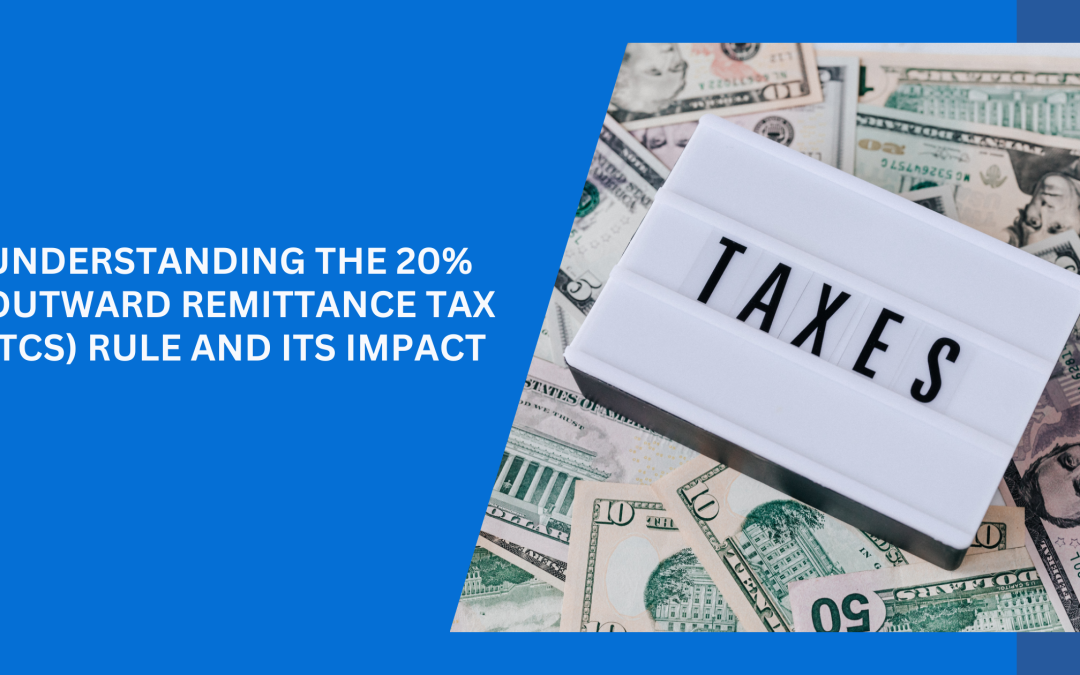What Is the 20% Outward Remittance Tax?
The outward remittance tax requires banks or authorized dealers to collect 20% TCS on foreign remittances exceeding ₹7 lakhs under the Liberalized Remittance Scheme (LRS). The tax applies to funds sent abroad for purposes such as:
- Investments in foreign assets
- Purchasing property abroad
- Gifting money to family or friends abroad
- Other personal remittances not falling under exceptions
Key Features of the 20% TCS Rule
- Threshold for Applicability
- TCS is applicable only on the amount exceeding ₹7 lakhs in a financial year.
- For example, if you remit ₹10 lakhs, TCS will apply to ₹3 lakhs.
- TCS Rates for Different Categories
- 20% TCS: For general remittances, such as investments and gifts.
- Lower TCS for Exceptions: Medical treatment and education expenses attract lower TCS rates.
- Who Collects TCS?
- Banks and authorized dealers collect TCS at the time of remittance and deposit it with the Income Tax Department.
- Exemptions
- Remittances from NRO (Non-Resident Ordinary) or FCNR (Foreign Currency Non-Resident) accounts are exempt when done through the remittor process.
- Tax Credit for NRIs
- NRIs can claim the TCS paid as a tax credit while filing their income tax returns in India or their country of residence (based on Double Tax Avoidance Agreements).
How Does the 20% TCS Rule Impact You?
The introduction of this rule has financial and procedural implications:
1. Increased Cost for High-Value Remittances
- For individuals sending large sums abroad, the 20% tax significantly increases the upfront cost.
- For instance, remitting ₹50 lakhs abroad would result in ₹8.6 lakhs (20% on ₹43 lakhs) being deducted as TCS.
2. Cash Flow Challenges
The upfront deduction affects liquidity, especially for those making recurring or high-value transfers.
3. Impact on Investments
NRIs investing in foreign assets or properties may need to account for this additional tax burden, potentially affecting ROI calculations.
4. Tax Credit Recovery
While NRIs can claim the TCS as a tax credit, the process can take time, depending on their country’s tax filing system.
5. Encouragement for Alternative Financial Channels
The rule may lead individuals to explore other exempted methods, such as using NRO or FCNR accounts for remittances.
Who Is Exempt from 20% TCS?
- Education Expenses Abroad
- Lower TCS rates apply to remittances made for tuition fees or related educational expenses.
- Medical Treatment
- Funds sent abroad for healthcare purposes are subject to lower TCS rates.
Tips to Minimize the Impact of 20% TCS
- Plan Remittances Strategically- Break remittances into smaller amounts across financial years to stay below the ₹7-lakh threshold.
- Use NRO/FCNR Accounts- Leverage these accounts for tax-exempt remittances when applicable.
- File for Tax Credit- Ensure accurate documentation to claim TCS credits during income tax filings.
- Consult Tax Professionals- Seek advice on managing tax liabilities, especially for large remittances or investments abroad.
Conclusion: Navigating the 20% TCS Rule with Brivan Consultants
The 20% outward remittance tax adds complexity to foreign remittances but is manageable with the right strategies. Whether you’re investing abroad, gifting funds, or managing high-value transactions, understanding the nuances of this rule is crucial for effective financial planning.
At Brivan Consultants, we specialize in guiding NRIs through India’s evolving tax landscape. From strategic remittance planning to tax credit claims, our team ensures compliance while helping you optimize your finances. Contact us today to make informed decisions and navigate the 20% Outward Remittance Tax TCS Rule for NRIs seamlessly.

